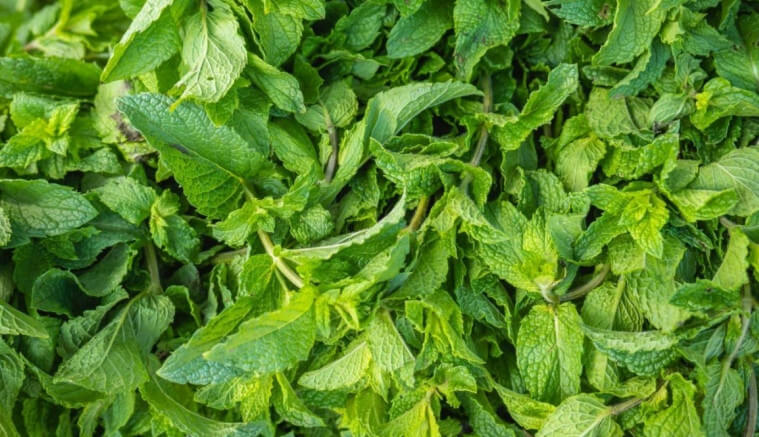You might have heard of spearmint before or used it for tea or added it to a fresh salad. This versatile herb, native to Europe and Asia, has long been embraced by various cultures for its delightful flavor and remarkable therapeutic potential. The tradition of using spearmint dates back to ancient civilizations, where it found a place not only in the culinary world but also in traditional medicine practices. As centuries have passed, scientific research has sought to unravel the hidden gems of spearmint, unearthing a treasure trove of benefits that extend beyond the palate.
“Spearmint” (Mentha spicata) is a perennial plant belonging to the mint family, cherished for centuries for both culinary and medicinal purposes. Its delicate green leaves exude a distinct, sweet, and minty fragrance that entices the senses and lingers in the memory.
Let’s dive together into the variety of therapeutic benefits this aromatic herb has to offer.
1. Helps with digestion
Spearmint has long been studied for its benefits to the digestive system. According to studies found, it contains a lot of chemicals that can help with digestion or digestion problems.
One of these chemicals is called alkaloids. In 2016 a study published in the Journal of Ethnopharmacology, alkaloids were studied up close as they were believed to be responsible for spearmint’s spasmolytic effects. Which helps relax the intestinal smooth muscles and reduce intestinal spasms.
Another study published in the Journal of Medicinal Food in 2011, demonstrated spearmint’s gastroprotective effects. This means spearmint consumption can help shield the stomach lining from damage such as ulcers(2).
2. Helps calm your nerves

Another important benefit we should discuss is the effect of spearmint on the central nervous system, specifically when it comes to anxiety and stress. Quite a few studies discuss how spearmint can help with anxiety (3).
A study published in Neurochemical Research in 2020 explored the GABA- modulatory effect of spearmint extract in neuronal cells, revealing its potential to influence GABA receptors. GABA, also known as gamma-aminobutyric acid, is an essential neurotransmitter that promotes feelings of calm and relaxation(4).
3. Can lower blood sugar
Although Spearmint hasn’t been specifically studied for blood sugar lowering. But a key compound that exists in spearmint called rosmarinic acid, has been. Rosmarinic acid is a natural phenolic compound that exists in abundance in spearmint leaves.
This chemical has been studied particularly in people with diabetes or impaired glucose metabolism.
In a study published in the Journal of Agricultural and Food Chemistry in 2014 by Hsaio et al (5), rosmarinic acid has proven to help glucose metabolism by enhancing insulin sensitivity, which in turn leads to improved glucose update and thus a reduction in blood sugar levels.
There is also another mechanism that has been shown to potentially lower blood sugar levels. A study published in 2019 tested the essential oil extract from spearmint’s leaves on two carbohydrate hydrolyzing enzymes, named alpha-amylase and alpha-glucosidase. This in vitro study showed that the leaf essential oils of spearmint at doses of 200 and 250 microliters were able to inhibit these enzymes(6).
These enzymes are heavily involved in carbohydrate digestion and so by inhibiting their activity, spearmint, in turn, can potentially slow down carbohydrate breakdown and glucose absorption, which is a promising mechanism when it comes to treating diabetes (6).
From these studies, we can consider that M. Spicata may be used as an antidiabetic agent, however, further investigations, as well as clinical trials, need to be carried out in order to prove this benefit in humans.
4. Can help with hirsutism

Hirsutism is a condition in women that causes excessive growth of dark and coarse hair. This is most commonly occurring in people who have PCOS.
PCOS is a common hormonal disorder that often involves high levels of androgen, which is a male hormone, leading to many symptoms such as hirsutism (excessive hair growth), acne, and irregular menstrual cycles.
In 2020, Grant P et al conducted a study on the antiandrogenic effect of spearmint tea on women with PCOS.
The study was a two-center, 30-day randomized controlled trial. Forty-two volunteers were randomized to drink spearmint tea twice a day for 1 month and the results were compared with a placebo herbal tea. Serum androgen hormone levels and gonadotrophins were checked at 0, 15, and 30 days. The degree of hirsutism was assessed using the Ferriman- Galwey score and a questionnaire to assess the improvements in the levels of self-reported hirsutism. By the end of the study, forty-one out of the forty-two participants had completed the study. Free and total testosterone were significantly reduced after 30 days, however, there was no noticeable improvement in hirsutism. Arguably the duration of the study wasn’t long enough to assess the difference, however, the reduction in testosterone levels can be promising if another study is conducted for a longer period of time.
These findings indicate that spearmint tea effectively lowers testosterone levels in women with PCOS, which suggests the potential to help manage hormonal imbalances and related symptoms(7).
5. Can help with cognitive function
Another benefit of rosmarinic acid is to help protect brain cells from damage caused by oxidative stress and inflammation. A study published in the Journal of Neurochemistry International in 2018 highlighted this mechanism of action by studying the effect of rosmarinic acid in an in vitro model of Alzheimer’s disease(8).
Rosmarinic acid, as mentioned before, is abundantly present in spearmint leaves. And so, by protecting neurons, spearmint might help preserve cognitive function and memory. This effect, however, needs to be studied more extensively in humans before we can confirm causality. Spearmint extract also proved to inhibit the activity of acetylcholinesterase in a study published in the journal Pharmacognosy Magazine by Ezzat et al. Acetylcholinesterase is an enzyme that breaks down the neurotransmitter acetylcholine, essential for memory and learning. Inhibiting the activity of this enzyme can enhance acetylcholine levels and, thus, cognitive function(9).
6. It is a great antioxidant

Antioxidants help protect us from damage caused by free radicals. In other words, antioxidants can protect us from aging, chronic diseases, and oxidative stress.
In a study titled “Antioxidant activity of spearmint methanol extract”, spearmint was studied for its antioxidant potential (10).
The study found that spearmint methanol extract demonstrated potential antioxidant activity. The extract showed the ability to scavenge and neutralize free radicals, which are unstable molecules that can cause oxidative damage to cells if left uncontrolled. This antioxidant activity of spearmint extract suggests its potential in combating oxidative stress and its associated health benefits.
7. Can improve insulin resistance in PCOS
We discussed Spearmint’s effect on blood glucose levels and also testosterone levels in women with PCOS. But how does this translate to its effect on insulin resistance in women with PCOS?
A randomized controlled trial of 60 women with PCOS investigated the effect of spearmint tea on insulin resistance.
The spearmint tea group received spearmint herbal tea twice daily for one month. When measuring insulin resistance levels before and after it was found that women who consumed spearmint tea experienced a significant reduction in insulin resistance compared to the placebo group. This reduction in insulin resistance indicated that spearmint tea might have a beneficial effect on insulin sensitivity in women with PCOS (11).
In conclusion, spearmint (M. spicata) offers a lot of proven health benefits, however, there is a lot of room for more extensive studies in order to translate this data into its effect on humans. However, it is definitely worth the try; next time you are having digestive issues or if you are struggling with hirsutism or other symptoms of PCOS, try a cup of spearmint tea twice a day and see what happens!
References
(1) Shakeri A, Sahebkar A, Javadi B. Melissa officinalis L. – A review of its traditional uses, phytochemistry, and pharmacology. J Ethnopharmacol. 2016 Feb 17;188:204-228. doi: 10.1016/j.jep.2016.05.010.
(2) Moghbel A, Farshbaf-Khalili A, Aghaie A, Abbasalizadeh F, Taghizadeh M, Khademi A, Ghasemi A, Ghaderi A. The effect of peppermint (Mentha piperita) on spasticity after stroke. Jundishapur J Nat Pharm Prod. 2016 Aug;11(3):e30532. doi: 10.5812/jjnpp.30532.
(3) Sarris J, Panossian A, Schweitzer I, Stough C, Scholey A. Herbal medicine for depression, anxiety, and insomnia: a review of psychopharmacology and clinical evidence. Eur Neuropsychopharmacol. 2011 Dec;21(12):841-860. doi: 10.1016/j.euroneuro.2011.04.002.
(4)Prasad SN, Raghu N, Ashok G, Sadashiva CT, Vinodini NA, Rao AP. Comparative effects of Mentha spicata and Vitamin E on lipids, lipid peroxidation and antioxidants in rats. J Med Food. 2012 Dec;15(12):1086-1092. doi 10.1089/jmf.2011.1915.
(5) Hsiao YH, Kuo YH, Chen YA, Chen YJ, Huang CJ, Yang WC. Rosmarinic acid stimulates glucose uptake in insulin-resistant skeletal muscle via the activation of AMP-activated protein kinase. J Agric Food Chem. 2014 Mar 26;62(12):2614-2621. doi: 10.10
(6)A. Bouyahya, F. Lagrouh, N. El Omari, et al., “Essential oils of Mentha viridis rich phenolic compounds show important antioxidant, antidiabetic, dermatoprotective, anti dermatophyte and antibacterial properties,” Biocatalysis and Agricultural Biotechnology, vol. 23, p. 101471, 2020.21/jf5003259.
(7) Grant P. Spearmint herbal tea has significant anti-androgen effects in polycystic ovarian syndrome. A randomized controlled trial. Phytother Res. 2010 Feb;24(2):186-188. doi: 10.1002/ptr.2900.
(8) Sandireddy R, Yerra VG, Areti A, Komirishetty P, Kumar A. Neuroprotective effects of rosmarinic acid in an in vitro model of Alzheimer’s disease: Investigating the role of the Nrf2 pathway. Neurochem Int. 2018 Nov;120:191-199. doi: 10.1016/j.neuint.2018.09.002.
(9) Ezzat SM, Okba MM, El-Din MS, El-Sawy ER, Kandil ZA. Acetylcholinesterase inhibitory and antioxidant activities of some medicinal plants and their relation to total phenolic contents. Rev Bras Farmacogn. 2015 Jan-Feb;25(1):61-67. doi 10.1016/j.bjp.2014.11.010.
(10) Aghel N, Rashidi I, Momtaz S, Alizadeh M, Ghorbanpour M, Farzamfar B. Antioxidant activity of spearmint (Mentha spicata) methanol extract. J Food Sci Technol. 2014 Feb;51(2):346-351. doi 10.1007/s13197-011-0459-2.
(11) Ahmadi Asrbadr, Y., Asemi, Z. (2018). Effect of spearmint on insulin resistance in PCOS: A randomized, placebo-controlled trial. Phytotherapy Research, 32(11), 2246-2252. doi: 10.1002/ptr.6163.)

 By myulikeadmin
By myulikeadmin



